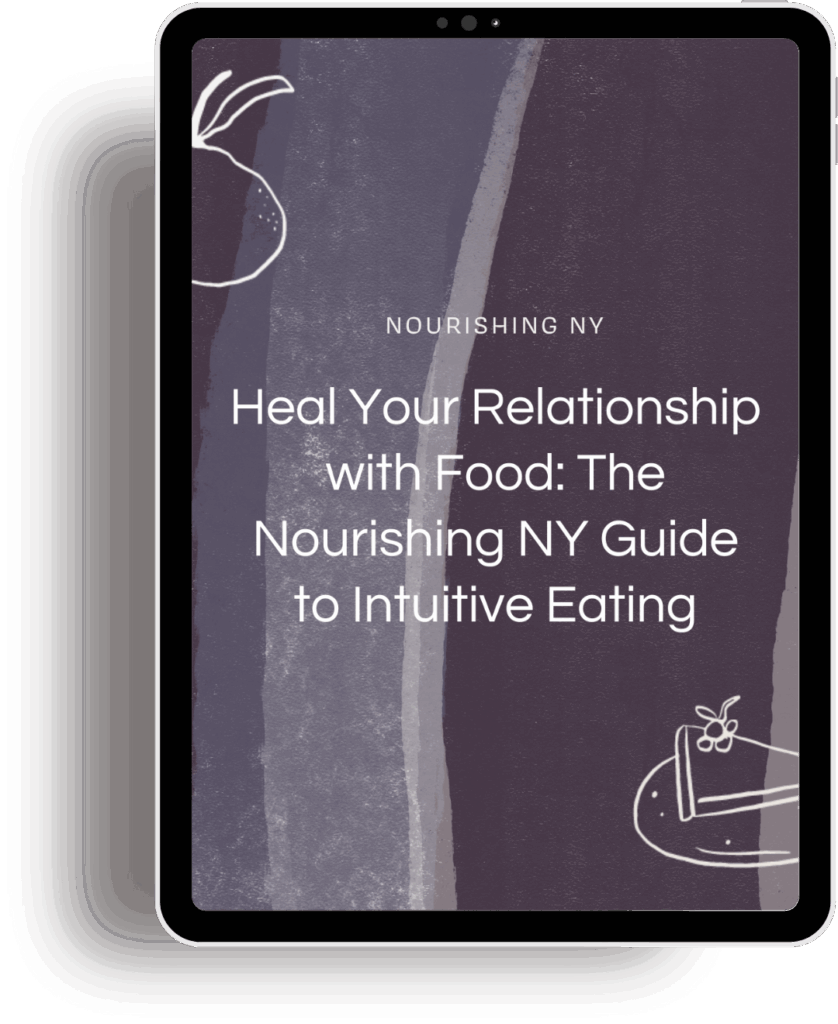Dietitians that specialize in eating disorders and disordered eating care understand and recognize that weight loss and restrictive diets cause harm (Bacon & Aphramor, 2011). Unfortunately, we live in a cultural climate that normalizes disordered eating and eating disorder behaviors as a way to manipulate one’s body and fit into society. A large part of the dietetic community continues to prescribe weight loss and body manipulation as a way to feel comfortable in one’s skin. Julie Dillon Duffy, a prominent dietitian and author, identifies this as, “dietitians are diet industry’s line leader enthusiastically chanting the battle cry that individuals can and should control their weight. Those unable or unwilling are cast aside and shamed, losing proximity to thinness and thus whiteness.” There is a very complex social-cultural dynamic related to the pursuit of body manipulation that impacts everyone, whether in pursuit or not. This makes it essential when seeking a dietitian that they’re educated and informed on diet culture and have the training and skills to support someone in moving toward a more compassionate style of care. Eating disorder trained dietitians utilize a therapeutic process similar to how a psychotherapist would engage clients. Following the same foundation of building rapport and trust to provide a safe, non-judgmental space for healing. This is a lengthy and intimate experience because talking about one’s relationship to food and their body encompasses one’s relationship to themselves. Dillon Duffy states “The way that we experience food mirrors how we relate to other and ourselves. Having a safe and stable way of eating that includes pleasure and promotes health helps us in every other area of life.”
The widespread recognition of Telehealth as an accepted and validated form of treatment has provided a monumental increase in access to care. However, this has led to the field of dietetics and nutrition being inundated with clinicians without consistent training. While the Registered Dietitian credential is nationally recognized, dietitians that do not specialize or have experience treating eating disorders are not a good fit to support someone in healing their relationship with food or their body and in many instances lead to further harm and traumatic experiences. A high percentage of our clients come to work with our team after having awful experiences working with dietitians, reciting being shamed and dismissed and finding their eating disorder or disordered eating patterns worsen. Although NYC has many nutritionists, not all are equipped to help with disordered eating.
Key Qualifications to Look For
While both dietitians and nutritionists focus on food and nutrition, they differ significantly in their training, scope of practice, and qualifications. Dietitians, often referred to as Registered Dietitian Nutritionists (RDNs) or Registered Dietitians (RDs), have more extensive education and clinical training, including supervised practice and passing a national exam. This allows them to provide medical nutrition therapy (MNT) and work with individuals with specific health conditions. In contrast, nutritionists may have varying levels of education and training, and there is no standardized national certification or exam required to practice under the title.
It’s important to find a provider who is experienced, compassionate, and aligned with your values. Here are some key things to look for:
- Credentials: Registered Dietitian (RD), Registered Dietitian Nutritionist (RDN), Certified Eating Disorder Specialist (CEDS), Certified Intuitive Eating Counselor (CIEC)
- Experience with eating disorders and disordered eating
- A weight-inclusive, HAES®-informed approach
- Collaborative style and trauma-informed care
At Nourishing NY, all our clinicians are credentialed dietitians that specialize and have significant training in eating disorder care and treating disordered eating. Our clinicians are trauma informed and practice health at every size care (HAES). HAES is synonymous with weight inclusive care and disordered eating treatment. It enables the clinician to treat the clients’ behaviors and interpret their lab values and metrics without judgement. More information on HAES can be found through the Association for Size Diversity and Health (ASDAH) https://asdah.org/haes/
Several of our clinicians are Certified Eating Disorder Specialists (CEDS), which includes 2500 hours of training. Additionally, several of our clinicians are certified in intuitive eating, which is a compassionate self-care eating framework that treats all bodies with dignity and respect (Tribole & Resch). Intuitive eating is an anti-diet eating framework that was originally published in 1995 and has become a launchpad for body and food-based advocacy. Intuitive eating’s core message states that we all have unconditional permission to eat—no matter our size.
Questions to Ask When Interviewing a Dietitian
- Do you specialize in disordered eating?
- What’s your treatment approach?
- Do you accept my insurance?
- What does a typical session look like?
- How do you tailor nutrition plans to individual needs?
- What’s your approach to weight and body image?
- How do you support emotional and behavioral aspects of recovery?
At Nourishing NY, our team of dietitians in NYC bring deep expertise, lived experience, and a compassionate approach to every session. Whether you’re looking for structure, flexibility, or emotional support, we’re here to help whether you’re located in NYC or seeking support virtually.
Red Flags to Avoid
- Providers shouldn’t focus on weight loss or food restrictions
- Encouragement of dieting, cleanses, or “good/bad” food language should not be part of the discussion and is a sign to look elsewhere
- Lack of collaboration with mental health providers is a big red flag
- Recommending weight loss medications to reduce “food noise”
Insurance and Accessibility in NYC
Finding in-network providers can feel overwhelming. It’s often challenging to identify a practice that meets all your criteria—one that aligns with your needs and values, makes you feel at ease, fosters trust, fits your schedule, and is covered by your insurance network.
We encourage you to utilize your insurance company’s provider directory as a place to start. Always double-check with the clinic or practice you are interested in, as this information is constantly being updated and changed. If upon researching a provider you come across someone who aligns with your values but does not take your insurance, it may be worth reaching out for possible recommendations of others who practice similarly and are in-network. In addition, many providers offer a sliding scale option if insurance is not in-network.
Nourishing NY accepts insurance and will determine your insurance’s estimate of coverage prior to starting care. We then offer a complimentary discovery call to help assess if we are the right fit for you and your needs. Nourishing NY can offer support for nutrition in NYC either in person or via telehealth sessions.
Final Tips for Finding the Right Fit
Working with a dietitian in NYC to heal your disordered eating needs to be a gentle, compassionate and intimate experience. You, as a client, need to feel heard, seen and validated – that is the beginning of a successful relationship and can tell you if it is a right fit. It takes immense courage to meet with a clinician and share your story, and it is a privilege for your clinician to have the opportunity to work with you, not the other way around.
Interested in working with one of our disordered eating nutritionists in NYC? Contact us
Resources
https://nutritionj.biomedcentral.com/articles/10.1186/1475-2891-10-9
Bacon & Aphramor
Finding Your Food Voice, Julie Dillon Duffy



